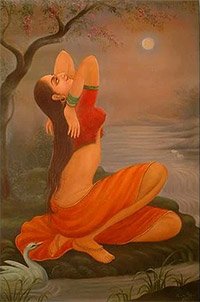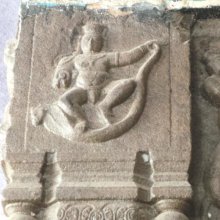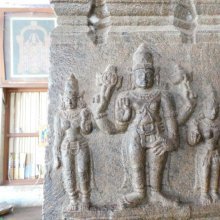Mardana: 22 definitions
Introduction:
Mardana means something in Hinduism, Sanskrit, Marathi, Hindi. If you want to know the exact meaning, history, etymology or English translation of this term then check out the descriptions on this page. Add your comment or reference to a book if you want to contribute to this summary article.
Images (photo gallery)
In Hinduism
Ayurveda (science of life)
Rasashastra (Alchemy and Herbo-Mineral preparations)
Source: Wisdom Library: Rasa-śāstraMardana (मर्दन):—Second of the eighteen Saṃskāra (special purification process). They are used to purify rasa (mercury) as per Rasaśāstra literature (Medicinal Alchemy), and are mentioned in texts such as the Rasaprakāśasudhākara. In Āyurveda, Saṃskāra refers to the “detoxification” process of metals and herbs. The Mardana-saṃskāra is commonly used for Dravya-karma and Rasāyana-karma, but also to remove various types of rasa-doṣa (mercury impurities). In other words: the first eight saṃskāras are sequentially used to purify and detoxify mercury in preparation for internal use. Mardana refers to the process of ‘grinding’, or trituration of steamed mercury in a mortar, together with plant and acidic substances.
Source: Google Books: The Alchemical BodyMardana is the “rubbing,” “grinding,” or “trituration” of steamed mercury in a mortar, together with plant and acidic substances.
Source: archive.org: History of Indian Science Technology (rasashastra)Mardana (मर्दन, “grinding”) refers to the second of eighteen alchemical purification processes of mercury (mahārasa, rasendra or pārada). A religio-philosophic base was given to mercury-based alchemy in India. Mercury was looked upon as the essence of God Śiva, and sulphur as that of Goddess Pārvatī.
Mercury had to undergo 18 processes (e.g., mardana) before it could be used for transforming either metals or the human body. A combination of male and female principles (i.e. mercury and sulphur) forming cinnabar or mercuric sulphide or even of mercury and mica, was supposed to be highly potent and was therefore consumed as a Rasāyana or medicine for increasing body fluids or vitality. The earliest mention of Rasāyana was found in Āyurveda which was probably composed by 8th or 9th century BC, since it was a part of Atharvaveda, the last of the four Vedas.
Source: CCRAS: Ayurvedic pharmacopoeia of India, Appendix IMardana (मर्दन):—The second of the eight purification steps of Pārada (mercury), also known as the Aṣṭasaṃskāra.—Take the ingredients numbered [i] to [vii] in to Khalva-yantra add with required amounts of Kāñji and levigate for three days. Remove Pārada and kalka, wash carefully with warm water and collect Pārada. (see the Rasahṛdayatantra 2.4: a 10th-century Sanskrit alchemical treatise by Govinda Bhagavatpāda).
Ingredients:
- Pārada [Mercury] (1 part),
- Guḍa (1/16th part),
- Dagdhorṇa (1/16th part),
- Lavaṇa [Saindhava-lavaṇa] (1/16th part),
- Mandira-dhūma (1/16th part),
- Iṣṭika-cūrṇa (1/16th part),
- Āsurī [Rājikā] (1/16th part),
- Kāñjika (Quantum satis).
Toxicology (Study and Treatment of poison)
Source: Shodhganga: Kasyapa Samhita—Text on Visha ChikitsaMardana (मर्दन) refers to “massaging” (the victim of a snake-bite), as described in the Kāśyapa Saṃhitā: an ancient Sanskrit text from the Pāñcarātra tradition dealing with both Tantra and Viṣacikitsā—an important topic from Āyurveda which deals with the study of Toxicology (Viṣavidyā or Sarpavidyā).—The decoded mantras are for those aspirants who may use it under the guidance of an able / qualified preceptor after due procedures of initiation or dīkṣā. Regarding the Mahāpadma-viṣaharaṇa-mantra (VII. 17- 9ab) it says: “Venom of Mahāpadma is decimated by this mantra when uttered with words like gṛhadāha (house on fire) to the accompaniment of the sound of musical instrument and by massaging (mardana) the victim”.
Unclassified Ayurveda definitions
Source: gurumukhi.ru: Ayurveda glossary of terms1) Mardana (मर्दन):—Severe pressing of body from feet to waist.
2) [mardanaḥ] Frequent rubbing

Āyurveda (आयुर्वेद, ayurveda) is a branch of Indian science dealing with medicine, herbalism, taxology, anatomy, surgery, alchemy and related topics. Traditional practice of Āyurveda in ancient India dates back to at least the first millenium BC. Literature is commonly written in Sanskrit using various poetic metres.
Kavya (poetry)
Source: Wisdom Library: KathāsaritsāgaraMardana (मर्दन) is the name of a Vidyādhara who fought on Śrutaśarman’s side in the war against Sūryaprabha, according to the Kathāsaritsāgara, chapter 48. Accordingly: “... when Śrutaśarman saw that, he quickly sent other ten lords of the Vidyādharas, chiefs of lords of hosts or lords of hosts of warriors,... and Mardana [and seven others], the eight similar sons of the Vasus born in the house of Makaranda”.
The story of Mardana was narrated by the Vidyādhara king Vajraprabha to prince Naravāhanadatta in order to relate how “Sūryaprabha, being a man, obtain of old time the sovereignty over the Vidyādharas”.
The Kathāsaritsāgara (‘ocean of streams of story’), mentioning Mardana, is a famous Sanskrit epic story revolving around prince Naravāhanadatta and his quest to become the emperor of the vidyādharas (celestial beings). The work is said to have been an adaptation of Guṇāḍhya’s Bṛhatkathā consisting of 100,000 verses, which in turn is part of a larger work containing 700,000 verses.

Kavya (काव्य, kavya) refers to Sanskrit poetry, a popular ancient Indian tradition of literature. There have been many Sanskrit poets over the ages, hailing from ancient India and beyond. This topic includes mahakavya, or ‘epic poetry’ and natya, or ‘dramatic poetry’.
Jyotisha (astronomy and astrology)
Source: Wisdom Library: Brihat Samhita by VarahamihiraMardana (मर्दन) refers to the “conjunction of a planet (with other planets)”, according to the Bṛhatsaṃhitā (chapter 16) (“On the planets—graha-bhaktiyoga”), an encyclopedic Sanskrit work written by Varāhamihira mainly focusing on the science of ancient Indian astronomy astronomy (Jyotiṣa).—Accordingly, “If at the time of reappearance, a planet should appear bright, of large disc and in his natural condition, not crossed by thunderbolts, meteoric falls or dust-storms and not suffer in conjunction with other planets (graha-mardana) or if he should be in his house or in his Uccakṣetra or if he should be within sight of a benefic planet, he will bring prosperity to the persons and objects presided over by him. [...]”.

Jyotisha (ज्योतिष, jyotiṣa or jyotish) refers to ‘astronomy’ or “Vedic astrology” and represents the fifth of the six Vedangas (additional sciences to be studied along with the Vedas). Jyotisha concerns itself with the study and prediction of the movements of celestial bodies, in order to calculate the auspicious time for rituals and ceremonies.
Kama-shastra (the science of Love-making)
Source: Shodhganga: Elements of Art and Architecture in the Trtiyakhanda of the Visnudharmottarapurana (kama)Mardana (मर्दन) refers to “pressing” or “dressing” (the hair) and represents one of the “sixty four kinds of Art”, according to the Kāmasūtra of Vātsyāyaṇa.—Indian tradition, basically includes sixty four Art forms are acknowledged. The references of sixty four kinds of kalā are found in the Bhāgavatapurāṇa, Śaiva-Tantras, Kāmasūtra of Vātsyāyaṇa etc.—Cf. “utsādane saṃvāhane keśamardane ca kauśalam”—“proficiency in pressing, shampooing and dressing hair”.

Kamashastra (कामशास्त्र, kāmaśāstra) deals with ancient Indian science of love-making, passion, emotions and other related topics dealing with the pleasures of the senses.
Yoga (school of philosophy)
Source: ORA: Amanaska (king of all yogas): A Critical Edition and Annotated Translation by Jason BirchMardana (मर्दन) refers to “rubbing (one’s perspiration)” (back into the body), according to the Yogaśāstra (verse 12.37).—Accordingly, “Now, softness of the body [arises when the highest reality manifests,] even without rubbing (mardana) one’s perspiration [svedanamardanavivarjanenāpi] [back into the body,] and this illuminating reality makes [the body] glossy without oil”.

Yoga is originally considered a branch of Hindu philosophy (astika), but both ancient and modern Yoga combine the physical, mental and spiritual. Yoga teaches various physical techniques also known as āsanas (postures), used for various purposes (eg., meditation, contemplation, relaxation).
Languages of India and abroad
Marathi-English dictionary
Source: DDSA: The Molesworth Marathi and English Dictionarymardana (मर्दन).—n (S) Rubbing. 2 An operation in general to soften or relax, or to reduce to dust or powder; as pressing and squeezing, treading and trampling, kneading, crushing, pounding, grinding &c. &c.: also (in poetry passim) slaughtering, massacring, drubbing, pommeling, rough handling. mardanaṃ guṇavardhanaṃ (Sanskrit adage.) Bruising and pounding exalts or improves the virtues (of drugs &c.) 2 Flogging brightens the faculties.
Source: DDSA: The Aryabhusan school dictionary, Marathi-Englishmardana (मर्दन).—n Rubbing; slaughtering.
--- OR ---
mardānā (मर्दाना).—a Bold, intrepid.
Marathi is an Indo-European language having over 70 million native speakers people in (predominantly) Maharashtra India. Marathi, like many other Indo-Aryan languages, evolved from early forms of Prakrit, which itself is a subset of Sanskrit, one of the most ancient languages of the world.
Sanskrit dictionary
Source: DDSA: The practical Sanskrit-English dictionaryMardana (मर्दन).—a. (-nī f.) [मृद्-ल्यु ल्युट् वा (mṛd-lyu lyuṭ vā)] Crushing, grinding, destroying, tormenting, rubbing, &c.; सलक्ष्मणं राघवमाजि- मर्दनम् (salakṣmaṇaṃ rāghavamāji- mardanam) Rām.5.37.67.
-nam 1 Crushing, grinding.
2) Rubbing, shampooing; मदर्नं गुणवर्धनम् (madarnaṃ guṇavardhanam).
3) Anointing (with unguents &c.).
4) Pressing, kneading.
5) Paining, tormenting, afflicting.
6) Destroying.
7) Devastating, laying waste.
8) Opposition of planets.
9) Breaking up (as of ice &c.).
Source: Cologne Digital Sanskrit Dictionaries: Edgerton Buddhist Hybrid Sanskrit DictionaryMardana (मर्दन).—name of a yakṣa: Mahā-Māyūrī 14; in Mahā-Māyūrī 24 perhaps name of a place (or of a yakṣa? Lévi, p. 69).
Source: Cologne Digital Sanskrit Dictionaries: Benfey Sanskrit-English DictionaryMardana (मर्दन).—i. e. mṛd + ana, n. 1. Rubbing, [Pañcatantra] 238, 7. 2. Touching, [Śṛṅgāratilaks] 14. 3. Grinding, [Hitopadeśa] iii. [distich] 76.
Source: Cologne Digital Sanskrit Dictionaries: Cappeller Sanskrit-English DictionaryMardana (मर्दन).—[feminine] ī crushing, grinding, rubbing, pressing, afflicting, destroying (gen or —°); [neuter] the action of crushing etc., also anointing with (°—).
Source: Cologne Digital Sanskrit Dictionaries: Monier-Williams Sanskrit-English Dictionary1) Mardana (मर्दन):—[from marda] mf(ī)n. crushing, grinding, rubbing, bruising, paining, tormenting, ruining, destroying, [Mahābhārata; Kāvya literature] etc. (cf. candrārka-, samaraand samiti-m)
2) [v.s. ...] Name of a king of the Vidyā-dharas
3) [from marda] n. the act of crushing or grinding or destroying, [Kāvya literature; Kathāsaritsāgara; Bhāgavata-purāṇa]
4) [v.s. ...] rubbing, anointing, [Kāvya literature; Pañcatantra] etc. (-śālā f., [Siṃhāsana-dvātriṃśikā or vikramāditya-caritra, jaina recension]), cleaning or combing (the hair; See keśa-m)
5) [v.s. ...] friction id est. opposition (of planets; See graha-m).
Source: DDSA: Paia-sadda-mahannavo; a comprehensive Prakrit Hindi dictionary (S)Mardana (मर्दन) in the Sanskrit language is related to the Prakrit words: Maddaṇa, Malaṇa.
[Sanskrit to German]
Sanskrit, also spelled संस्कृतम् (saṃskṛtam), is an ancient language of India commonly seen as the grandmother of the Indo-European language family (even English!). Closely allied with Prakrit and Pali, Sanskrit is more exhaustive in both grammar and terms and has the most extensive collection of literature in the world, greatly surpassing its sister-languages Greek and Latin.
Hindi dictionary
Source: DDSA: A practical Hindi-English dictionaryMardana (मर्दन) [Also spelled mardan]:—(nm) massage; rubbing; crushing down, trampling.
...
Kannada-English dictionary
Source: Alar: Kannada-English corpusMardana (ಮರ್ದನ):—
1) [noun] the act of crushing as by pounding.
2) [noun] the act or an instance of rubbing the surface of something on the surface of something else.
3) [noun] a pressing of the feet or other parts of the body, gently as to relieve from pain.
4) [noun] the act of squeezing, pressing (the breast of a woman).
5) [noun] the act of destroying, demolishing; destruction.
6) [noun] the act or an instance of inflicting violent pain.
7) [noun] (in comp.) a man who destroys or demolishes; a destroyer.
8) [noun] ಮರ್ದನ ಮಾಡು [mardana madu] mardana māḍu to squeeze or press (the breast of a woman).
9) [noun] to kill or destroy.
Kannada is a Dravidian language (as opposed to the Indo-European language family) mainly spoken in the southwestern region of India.
See also (Relevant definitions)
Starts with: Mardanagi, Mardanashala, Mardanavidhi.
Ends with (+57): Abhimardana, Abhyamardana, Akshimardana, Amardana, Amshumardana, Anavamardana, Angamardana, Anupamardana, Apamardana, Arimardana, Avamardana, Cakramardana, Candrapramardana, Candrarkamardana, Candravimardana, Canuramardana, Chandrarkamardana, Chandravimardana, Chanuramardana, Dadamardana.
Full-text (+56): Muramardana, Arimardana, Mardita, Malana, Samitimardana, Kaliyamardana, Canuramardana, Kamamardana, Maddana, Pamsumardana, Shatrumardana, Mardanashala, Ashtasamskara, Mardanem, Mardin, Pashandamukhamardana, Madhvamukhamardana, Upamarda, Candrarkadipa, Yavamardana.
Relevant text
Search found 19 books and stories containing Mardana, Mardānā, Mardaana; (plurals include: Mardanas, Mardānās, Mardaanas). You can also click to the full overview containing English textual excerpts. Below are direct links for the most relevant articles:
Garga Samhita (English) (by Danavir Goswami)
Verse 1.10.44 < [Chapter 10 - Description of the Birth of Lord Balarāma]
Verse 2.15.1 < [Chapter 15 - Description of Śrī Rādhā-Kṛṣṇa’s Falling in Love]
Verse 5.1.1 < [Chapter 1 - Advice to Kaṃsa]
Bhakti-rasamrta-sindhu (by Śrīla Rūpa Gosvāmī)
Verse 2.4.187 < [Part 4 - Transient Ecstatic Disturbances (vyābhicāri-bhāva)]
Verse 3.3.27 < [Part 3 - Fraternal Devotion (sakhya-rasa)]
Verse 2.4.104 < [Part 4 - Transient Ecstatic Disturbances (vyābhicāri-bhāva)]
Rasa Jala Nidhi, vol 1: Initiation, Mercury and Laboratory (by Bhudeb Mookerjee)
Part 5 - Mercurial operations (3): Rubbing of Mercury (mardana) < [Chapter IV-V - Mercurial operations]
Part 2 - Eighteen different kinds of Mercurial operations < [Chapter IV-V - Mercurial operations]
Bhajana-Rahasya (by Srila Bhaktivinoda Thakura Mahasaya)
Text 20 < [Chapter 8 - Aṣṭama-yāma-sādhana (Rātri-līlā–prema-bhajana sambhoga)]
Text 11 < [Chapter 5 - Pañcama-yāma-sādhana (Aparāhna-kālīya-bhajana–kṛṣṇa-āsakti)]
Chaitanya Bhagavata (by Bhumipati Dāsa)
Verse 1.2.209 < [Chapter 2 - The Lord’s Appearance]
Related products
(+13 more products available)







